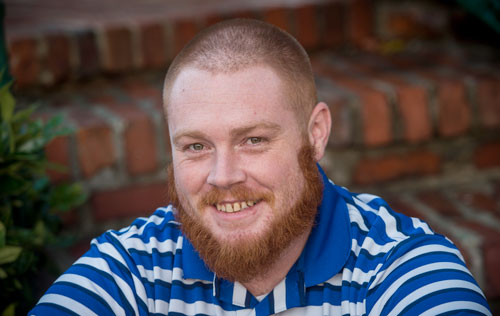
By Shannon Thomason
UAB News

Ben Rodden had used marijuana, alcohol, pills and other drugs since he was a young teen, and heroin as a young adult, and he was “willing to do whatever it took” to get sober. Now two years sober, Rodden is a student at the University of Alabama at Birmingham, and credits UAB’s Collegiate Recovery Community for helping him and other students in recovery maintain their sobriety and forward momentum while pursuing their educations.
Rodden, now 27, had to learn how to live. A recovery community, The 4th Dimension, taught him “how to live without putting drugs in my body, just how to be a functioning person, really.”
Education is important to Rodden, but a college campus can introduce unique challenges to sobriety. The Collegiate Recovery Community at UAB promotes and advances personal, academic and professional achievement in pursuit of long-term recovery, health and well-being, and productive engagement in society.
The CRC program offers students in long-term recovery a safe space for peer-to-peer support and accountability, social support and mentoring, guidance toward academic self-efficacy, and community service and leadership opportunities. In the program’s first year, UAB CRC has 12 official members, with an average GPA of 3.48. Nearly 60 students have been served through programs and events, and the feedback from students involved in the group has been overwhelmingly positive.
College students who have embraced long-term recovery from alcohol and drugs need support from one another and from their university communities to excel academically while staying healthy, says CRC project manager Luciana C. Silva, Ph.D., LMFT.
UAB’s CRC offers weekly Tuesday night recovery group meetings, mindfulness meditation and spiritual support, sober options for socializing including weekly dinners and holiday celebrations, academic tutoring and coaching, open evening study hours and study space, scholarships, and professional development opportunities.
“College can be an environment focused on alcohol and drugs, so it is important to have a support network intact when students in recovery start school,” Silva said. “One of the harder parts about recovery is being able to do fun stuff without alcohol and drugs being a part of it.” UAB CRC has done Sober Spring Break, kayaking and whitewater rafting, outdoor adventure day trips, an equine-assisted wellness workshop, and a climbing wall workshop, attended a Birmingham Barons game, and hosted a Sobertoberfest.
The group will host an open house from 4-6 p.m. today, in its new dedicated space in The Wellness House, 1715 Ninth Ave. South. All are welcome to meet the staff and learn about the program. For more details, visit the group online at uab.edu/studenthealth/recovery-community.
The UAB CRC staff also includes Taylor Milam, a student seven years sober, who serves as the program assistant, and is connected to the Greater Birmingham recovery community, as well as Angela Stowe, Ph.D., from Wellness Promotion in Student Affairs.
On Feb. 11, UAB CRC will present a Recovery Conference from noon-10 p.m. in the Hill Student Center Alumni Theatre. Information on how to register is forthcoming on the group’s website.
For Rodden, sobriety has improved his life, given him goals and helped him regain a relationship with his family. Support from the CRC has been a big part of his success so far.
“This is the best time I’ve had in school since I’ve ever been in school,” he said. “It’s a lot easier now, I have a clear mind and I am motivated — there’re not other things I want to be doing. I’m not trying to go out and drink or do drugs. I stay focused, and it’s a lot easier.”
Rodden sponsors three other students and is also part of a group called Refuge Recovery, which is not a 12-step based program. Instead it focuses on mindfulness meditation, as many of the participants struggle with stress and anxiety.
“I was introduced to meditation at the very beginning of my sobriety, and so I teach meditation and mindfulness at the center,” Rodden said. “Mindfulness meditation, sitting down, focusing on my breath and learning to stay in the present moment: That’s been a big part of my sobriety.”
His plan is to finish a bachelor’s degree in business, and then get his master’s degree in social work to work for a nonprofit.
“My goal is to work in addiction,” Rodden said.




